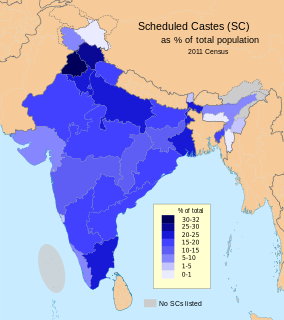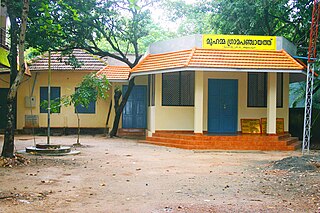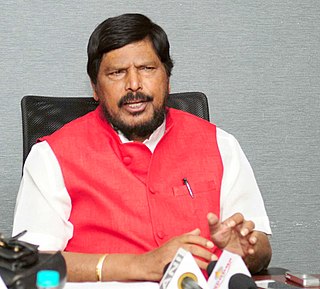Related Research Articles
Other Backward Class (OBC) is a collective term used by the Government of India to classify castes which are educationally or socially disadvantaged. It is one of several official classifications of the population of India, along with Scheduled Castes and Scheduled Tribes. The OBCs were found to comprise 52% of the country's population by the Mandal Commission report of 1980, and were determined to be 41% in 2006 when the National Sample Survey Organisation took place. There is substantial debate over the exact number of OBCs in India; it is generally estimated to be sizable, but many believe that it is higher than the figures quoted by either the Mandal Commission or the National Sample Survey.

The Scheduled Caste (SCs) and Scheduled Tribes (STs) are officially designated groups of people in India. The terms are recognised in the Constitution of India and the groups are designated in one or other of the categories. For much of the period of British rule in the Indian subcontinent, they were known as the Depressed Classes.

In India, the Panchayati Raj generally refers to the local self-government of villages in rural India as opposed to urban and suburban municipalities, this system was introduced by a constitutional amendment in 1992. Although it is based upon the historical panchayat system of the Indian subcontinent. The recommendation of LM Singhvi Committee (1986) was accepted. This Panchayati Raj system was formalized in 1992, following a study conducted by a number of Indian committees on various ways of implementing more decentralized administration. The modern Panchayati Raj and its Gram Panchayats are not to be confused with the extra-constitutional Khap Panchayats found in northern India.
Manikrao Hodlya Gavit in an Indian politician from Maharashtra. A member of the Indian National Congress (INC), he represented the Nandurbar from 1980 to 2014, winning the Indian general elections 9 times in a row which is a record. He holds the unique distinction of having been elected the highest number of times to the Lok Sabha from Maharashtra.

Ramdas Bandu Athawale is an Indian politician, social activist and senior Buddhist, Ambedkarite & Dalit leader from Maharashtra. He is the president of the Republican Party of India (A), a splinter group of the Republican Party of India and has its roots in the Scheduled Castes Federation led by B. R. Ambedkar. Currently, he is Minister of State for Social Justice and Empowerment in the Narendra Modi government, and represents Maharashtra in the Rajya Sabha, the upper house of India's Parliament. Previously he was the Lok Sabha MP from Pandharpur.
In March 2005, the then Prime Minister Manmohan Singh had constituted a seven-member High Level Committee headed by former Chief Justice of Delhi High Court Rajinder Sachar to study the social, economic and educational condition of Muslims in India.The committee submitted its report in 2006 and the report was available in public domain in November 30, 2006. The 403-page report had suggestions and solutions for the inclusive development of the Muslims in India.
The Ministry of Tribal Affairs, a branch of Government of India, looks after the affairs of the tribal communities in India.
The Ministry of Minority Affairs is a ministry of the Government of India which was carved out of Ministry of Social Justice and Empowerment and created on 29 January 2006. It is the apex body for the central government's regulatory and developmental programmes for the minority religious communities in India, which include Muslims, Sikhs, Christians, Buddhists, Zoroastrians (Parsis) and Jains notified as minority communities in The Gazette of India under Section 2(c) of the National Commission for Minorities Act, 1992.
The Ministry of Social Justice and Empowerment is a Government of India ministry. It is responsible for welfare, social justice and empowerment of disadvantaged and marginalised sections of society, including scheduled castes (SC), Other Backward Classes (OBC), the disabled, the elderly, and the victims of drug abuse.
The National Commission for Denotified, Nomadic and Semi-Nomadic Tribes (NCDNSNT) is a national commission set under the Ministry of Social Justice and Empowerment, Government of India, to study various developmental aspects of denotified and nomadic or semi-nomadic tribes in India.
The Mal is a Hindu caste found in the state of West Bengal & Jharkhand.They are also known as the Mal/Malla Kshatriya. Mal & Malla are derived from the Sanskrit word malla, meaning wrestler.
Pradhan Mantri Adarsh Gram Yojana (PMAGY) is a rural development programme launched by the central government in India in the financial year 2009–10 for the development of villages having a higher ratio of people belonging to the scheduled castes through convergence of central and state schemes and allocating financial funding on a per village basis.
India's National Commission for Backward Classes is a constitutional body under India's Ministry of Social Justice and Empowerment established on 14 August 1993. It was constituted pursuant to the provisions of the National Commission for Backward Classes Act, 1993.
Panna Lal Punia, usually known as P. L. Punia, is an Indian politician and Member of the Rajya Sabha from Uttar Pradesh since 2014. He was member of the Lok Sabha from 2009 to 2014 and represented Barabanki. He is a Dalit leader of the Indian National Congress party. He was also chairperson of the National Commission for Scheduled Castes between 2013-16 and as such sat ex officio on the National Human Rights Commission (NHRC).
The National Commission for Scheduled Castes is an Indian constitutional body established with a view to provide safeguards against the exploitation of Scheduled Castes and Anglo Indian communities to promote and protect their social, educational, economic and cultural interests, special provisions were made in the Constitution.Article 338 of the Indian constitution deals with National Commission for Scheduled Castes. Article 338 A deals with National Commission for Scheduled tribes.
The National Commission for Safai Karamcharis (NCSK) was formed as a statutory body to look into matters concerning the Safai Karamcharis’ welfare and makes recommendations to the government. For the first time, NCSK was constituted as a statutory body under the NCSK ACT, 1993. This commission continued till February 2004, when the relevant Act expired. Thereafter, the tenure of the commission has been extended from time to time, as a non-statutory body, the last such extension being up to 31 March 2022.
National Backward Classes Finance & Development Corporation (NBCFDC) was incorporated 13 January 1992 as a non profit company under the Ministry of Social Justice and Empowerment, Government of India to improve and develop the economic activities for the members of Backward Classes who are living below double the poverty line.
National Handicapped Finance and Development Corporation (NHFDC) was set up in January 1997 as a not for profit company under Ministry of Social Justice and Empowerment, Government of India. The corporation provides financial assistance for wide range of income generating activities to disabled persons.
National Safai Karamcharis Finance and Development Corporation (NSKFDC) was set up in January 1997 as a non profit company under Ministry of Social Justice and Empowerment, Government of India to empower the Scavengers, Safai Karamcharis and their dependents to break away their traditional occupation, depressed social condition and poverty and leverage them to work their own way up the social and economic ladder with dignity and pride. Its head office is currently located in Greater Kailash Enclave Part-II, New Delhi.
National Minorities Development and Finance Corporation (NMDFC) was incorporated in September 1994 as a non profit company under Ministry of Social Justice and Empowerment, Government of India to provide concessional finance for self-employment activities to eligible beneficiaries belonging to the minority communities, having a family income below double the poverty line.
References
- ↑ "National Scheduled Castes Finance & Development Corporation (NSFDC) - Schemes and Programs - Scheduled Caste Welfare: Ministry of Social Justice and Empowerment, Government of India". Socialjustice.nic.in. Retrieved 25 July 2013.
- ↑ "National Scheduled Castes Finance and Development Corporation". Nsfdc.nic.in. 31 March 2013. Retrieved 25 July 2013.